Ukraine is another transition-country. It has a lot in common with Russia, but also a lot with Europe or let’s say the EU. After all that’s probably why it is conflict prone.
I enter Ukraine almost at dusk and for the first 50 km I can’t see any difference. Forrest and rivers like in Russia. When I arrive in Nowhorod Siwerskyj it’s already dark and cold. I’m looking for a guesthouse, but when I find one they say all rooms are booked. It’s the same with all guesthouses, but one lady finally let’s me use the room of the staff.
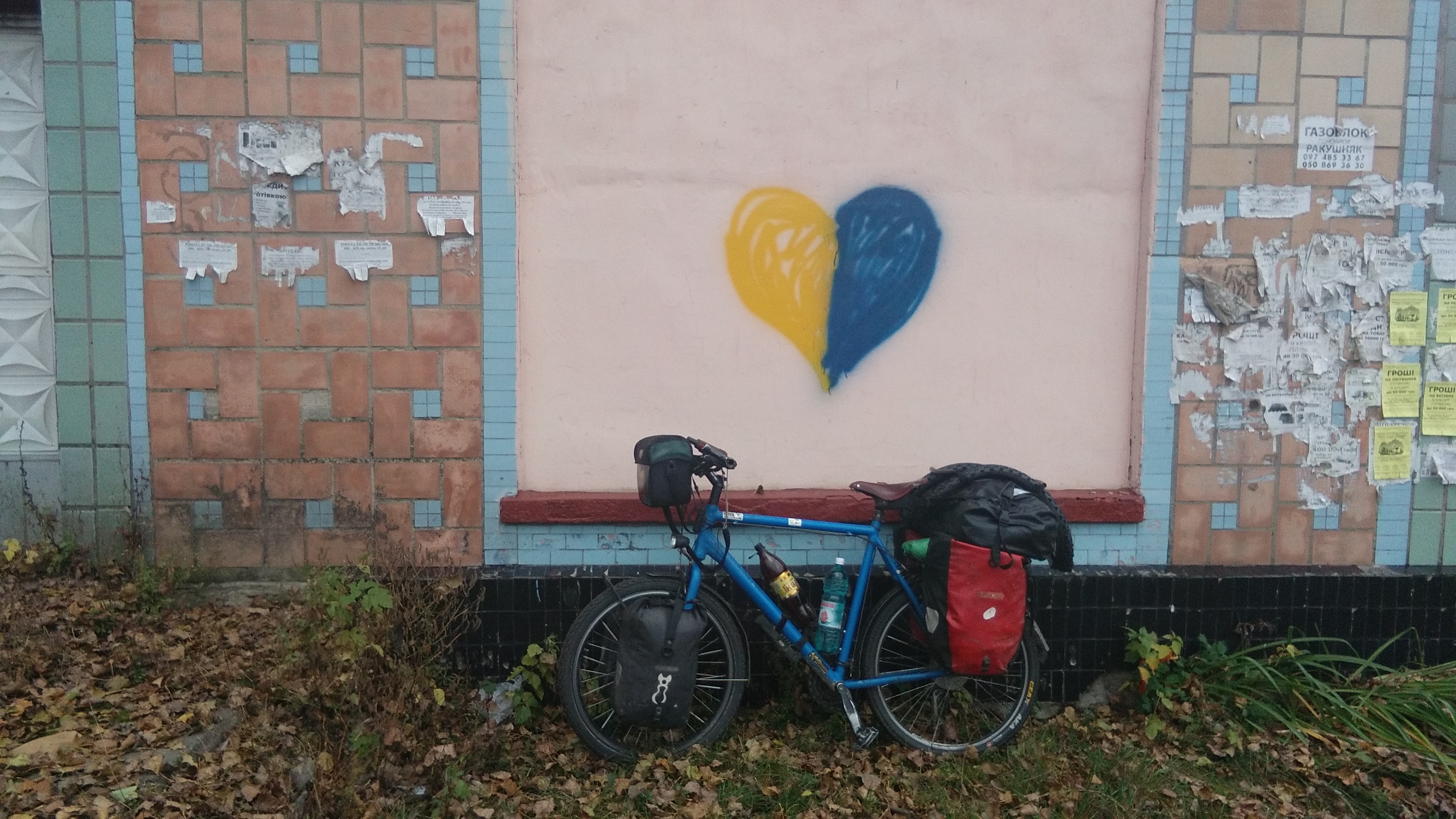
One thing is soon clear, Ukraine is the cheapest country on this journey, easily beating India and Nepal. A room in a hotel usually starts at 3 Euro per night, but is on European standards. The same with restaurants. Delicious burgers with french fries or a plate of Pelmeni for less than a Euro.
After a few days I arrive in Chernihiv north-east of Kiev. It has some beautiful churches and a big soviet-style square. Many shops, cafes and restaurants make me feel like home. Moscow had that, too, but was just too big.
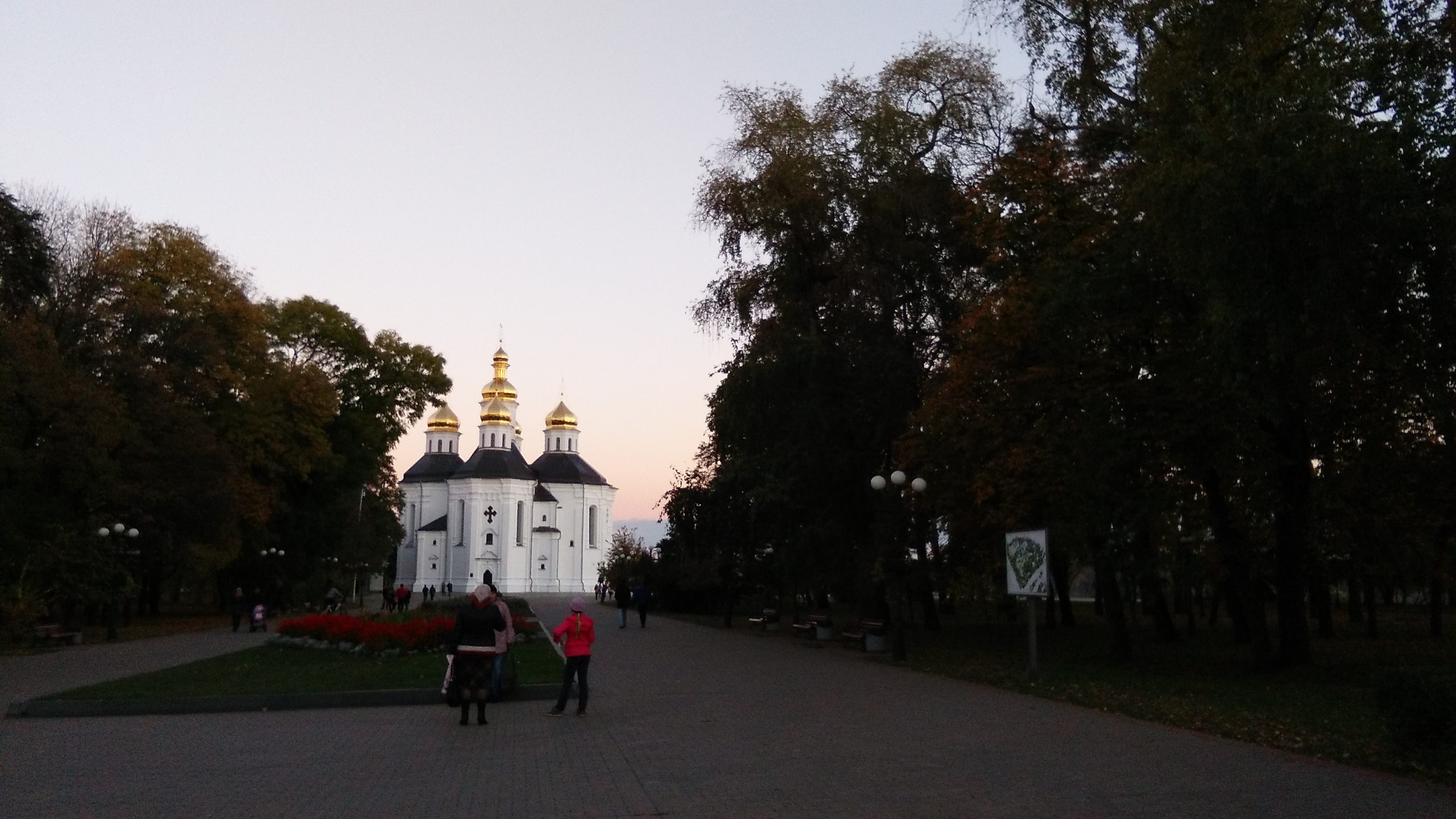
Two more days and I arrive in Kiev. I stay at a friend of Artem, Nadya. Her boyfriend Alex is a Russian soldier, who fought for Ukraine and can’t return to Russia, since he would be arrested then. I have a very interesting discussion with him.
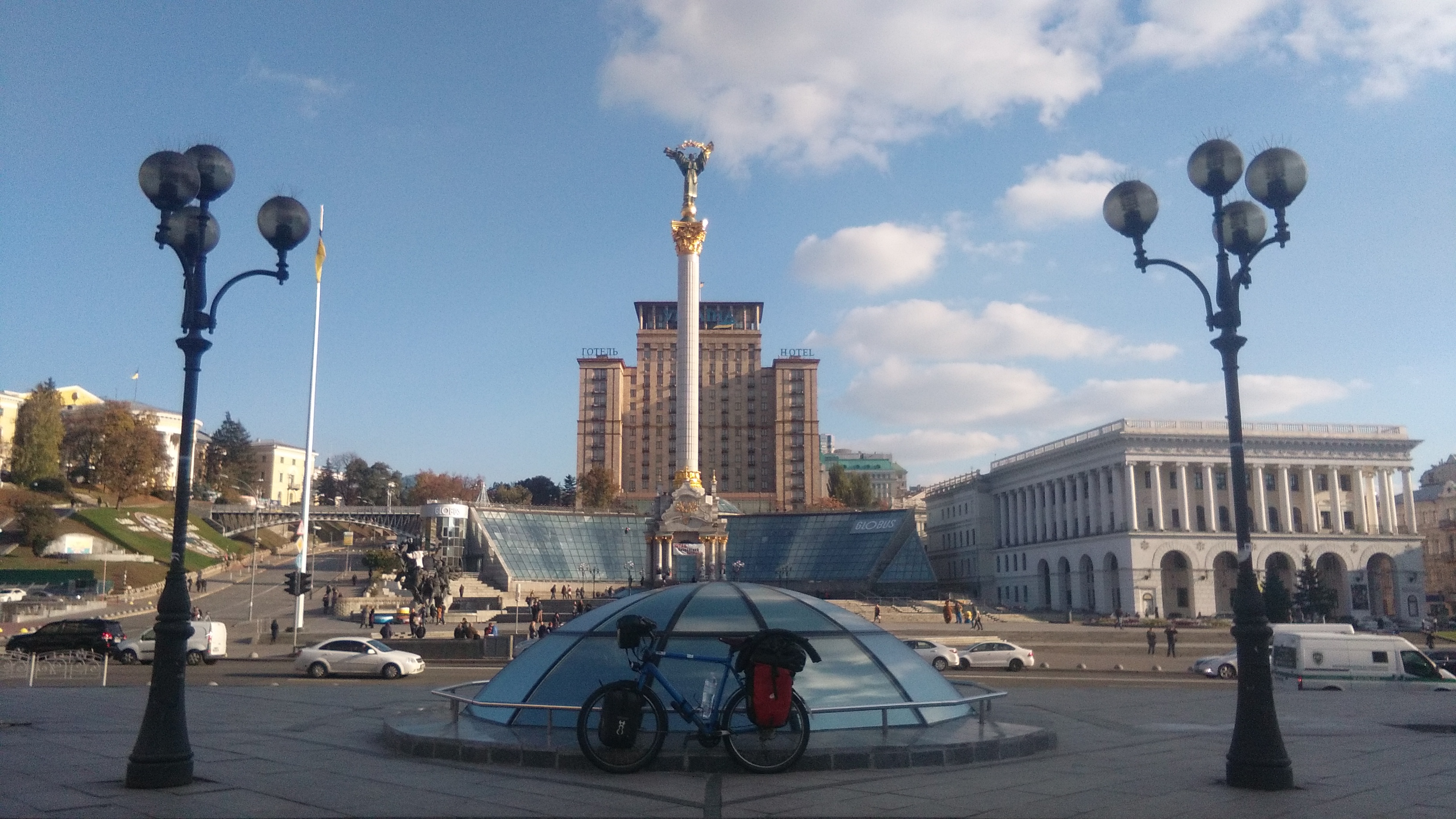
First thing Alex does is buy a bottle of vodka. But I told you, they don’t fool me again. The next morning Nadya shows me around in Kiev. Alex also wanted to join, but feels terrible. Yeah, the vodka. Know your limit! Nadya grew up in Kiev and knows the city. On the picture above you see a street left of the Maidan going uphill underneath the bridge. That’s where the fighting took place three years ago. Pictures of all the people, who died there are left and right of the street. I remember the images on TV. The tree with two people taking cover, when suddenly one gets hit by a bullet and falls to the left. Dead. It’s strange, when you pass this tree and the image is flickering inside of you.
But today everything seems normal. People on the streets. Maybe some more soldiers than usual, but only at government buildings and certain other places.
Kiev is a beautiful city. Not only has it many old buildings, it also lies between hills, has many parks and even forest. Nadya shows me many famous buildings, she loves her city.

As you can see, it’s getting even more European. No big soviet square, no Lenin statues. With the Dnepr river and its architecture, Kiev very much reminds me of Budapest. Back when we were in Budapest I felt far away for the first time. Now I feel close.
I continue after two nights in Kiev. In the evening I arrive in Makariv. The map shows no guesthouse, but the city seems big enough, so I ask around. I see a well dressed man and ask him. He wants to help and speaks German pretty well. While we are talking a couple passes by and asks in German, if they can help. You see, that’s what I mean with transition. More and more people speak English or German. But everybody also speaks Russsian.
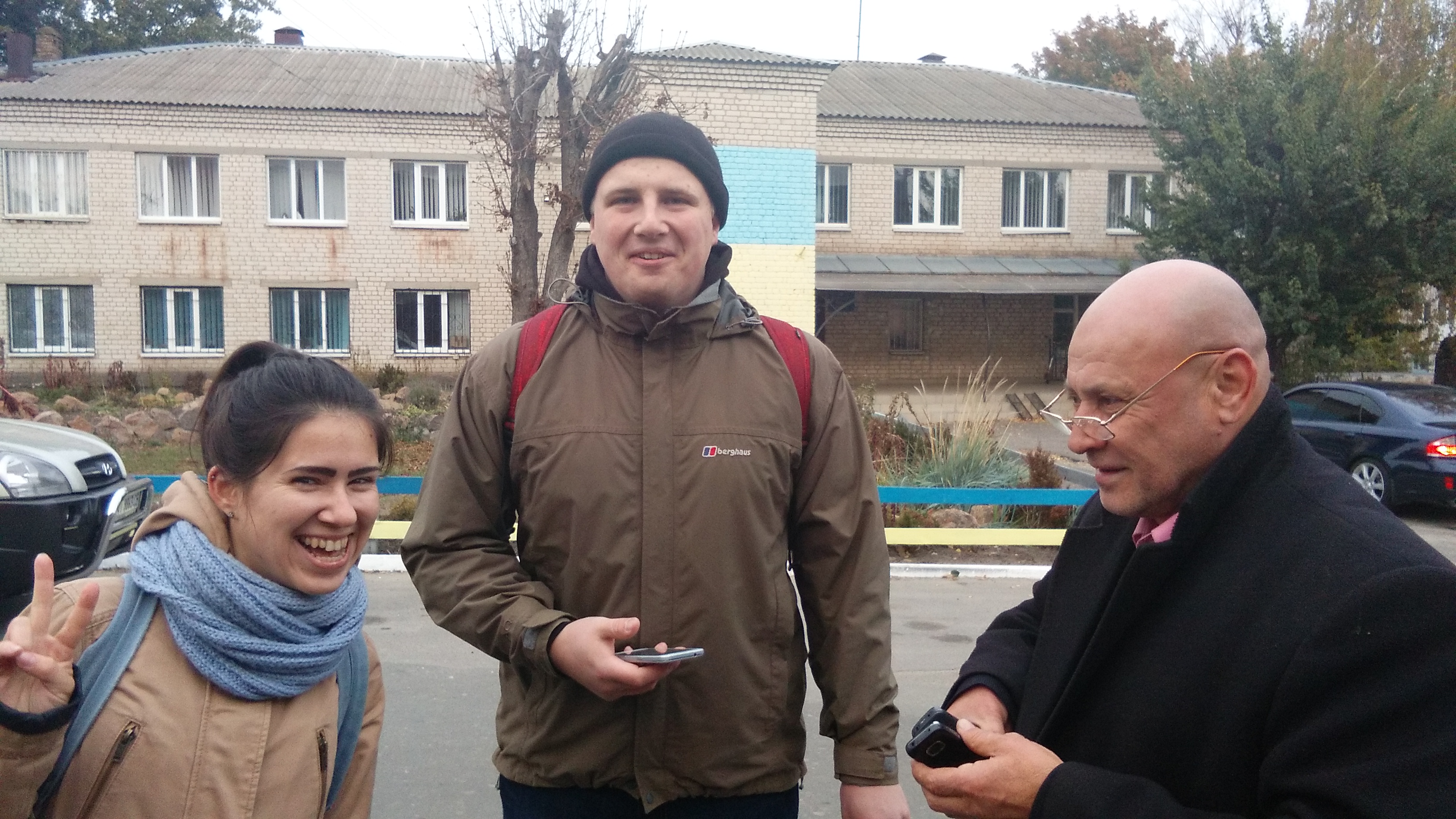
I end up having dinner with Irina and Arseniy, who are incredibly supportive. Irina is working at the Goethe Institute. Hence her good German. Arseniy is a software developer like me. I stay in a hotel room which is actually for 6 people, but since I am off season, it feels like I have my own suite: Bathroom, living room with a couch and TV and two sleeping rooms. However, I just close my eyes.
The next day I stand at a traffic light in Radomyshl, when a guy on a bicycle waves at me. It’s Alexander, a local politician and bicycle enthusiast. He invites me for a coffee and then accompanies me for 20 km. Actually he himself pulled down the Lenin statue in Radomyshl three years ago and locally promotes the Eurovelo 4, which is supposed to lead from the Atlantic Ocean up to Kiev.
Eurovelo 4
Actually since Kiev I am on the Eurovelo 4. That’s my route to Germany and since Moscow I was looking forward to seeing this familiar sign, which also means that I don’t have to care about which road to take. Unfortunately it’s not like that. There are no signs. The route is only planned, but not yet realized.
Apparently a good part of the Eurovelo 4 is not realized. At least its eastern part. Bad for me, but Alexander is trying to change that. I heard it is also not realized in Poland. Maybe in Czech Republic…
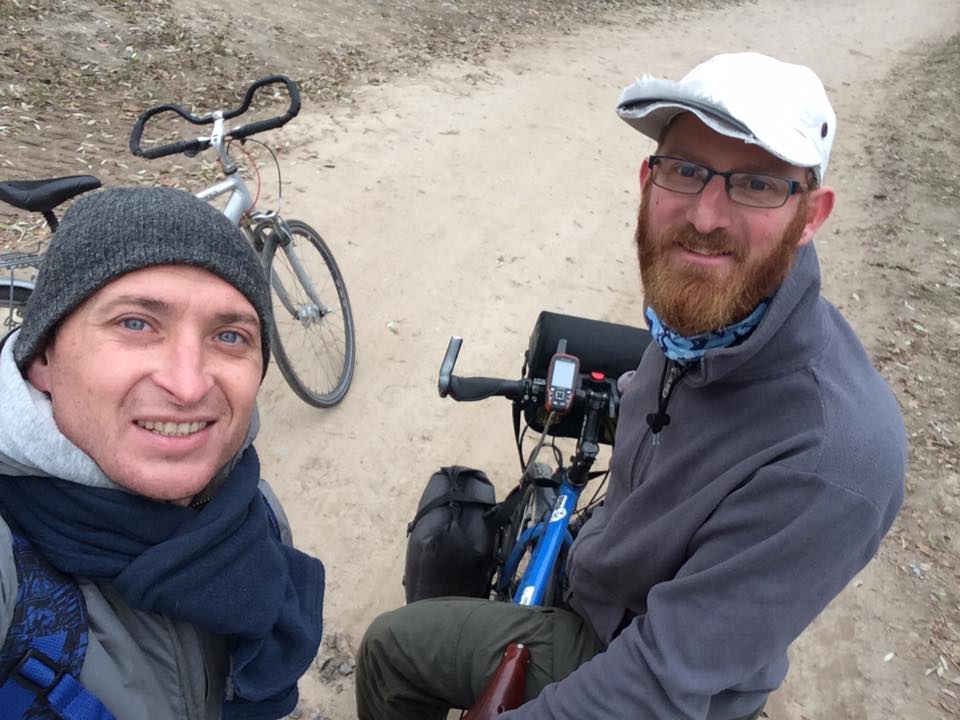
I continue and stay a night in Polonne, a small town with only one cafe, but that one cafe is great. Pizza, burgers, cakes, smoothies, cocktails, draft beer and many people. I love it so much, that I decide to stay another day, when I realize it’s raining the next morning.
When I finally continue the road is well paved and a day of rest always feels like you have a new pair of legs. I want to make it to Dubno, 170 km away, so I push the pedals. Perfect road, high air pressure in the tires. I move fast. 40 km to Dubno I leave the road. Soon there is only cobble stone. Ukrainians love cobble stone. They have that everywhere. Not only in cities. Sometimes you move half a day on narrow streets of cobble stone through the countryside and feel like you must arrive in ancient Rome soon.
My wheels take some hard hits and my Korean rear wheel soon can’t handle it any more. A spoke breaks, then another one. And another one. The wheel wobbles badly. A few centimeters to both sides. I have to remove the brake to move on. Meanwhile a proper European autumn storm has arrived and pushes me back. Only ten more kilometers to Mizoch, the next town. It’s too small for a bicycle shop and there is also no guesthouse on the map, but maybe there is a bus going to Dubno. At sunset I am only 3 km away from the town and the road takes a turn, so the wind blows sideways. Then a downhill. Almost there. Suddenly: Bang! The rear tire actually explodes. It’s just flat from one second to another. I push the bicycle to the center of town when it is already getting dark.
I ask for a guesthouse. No, not here. I tell people, that I wonder if someone could just host me for a night in his home. One guy gets the hint. We had so much trouble in Central Asia, it’s actually nice to see, that when your problems just get big enough, there is always someone who will help.
I spend the evening with three funny Ukrainians and their equally funny wives.
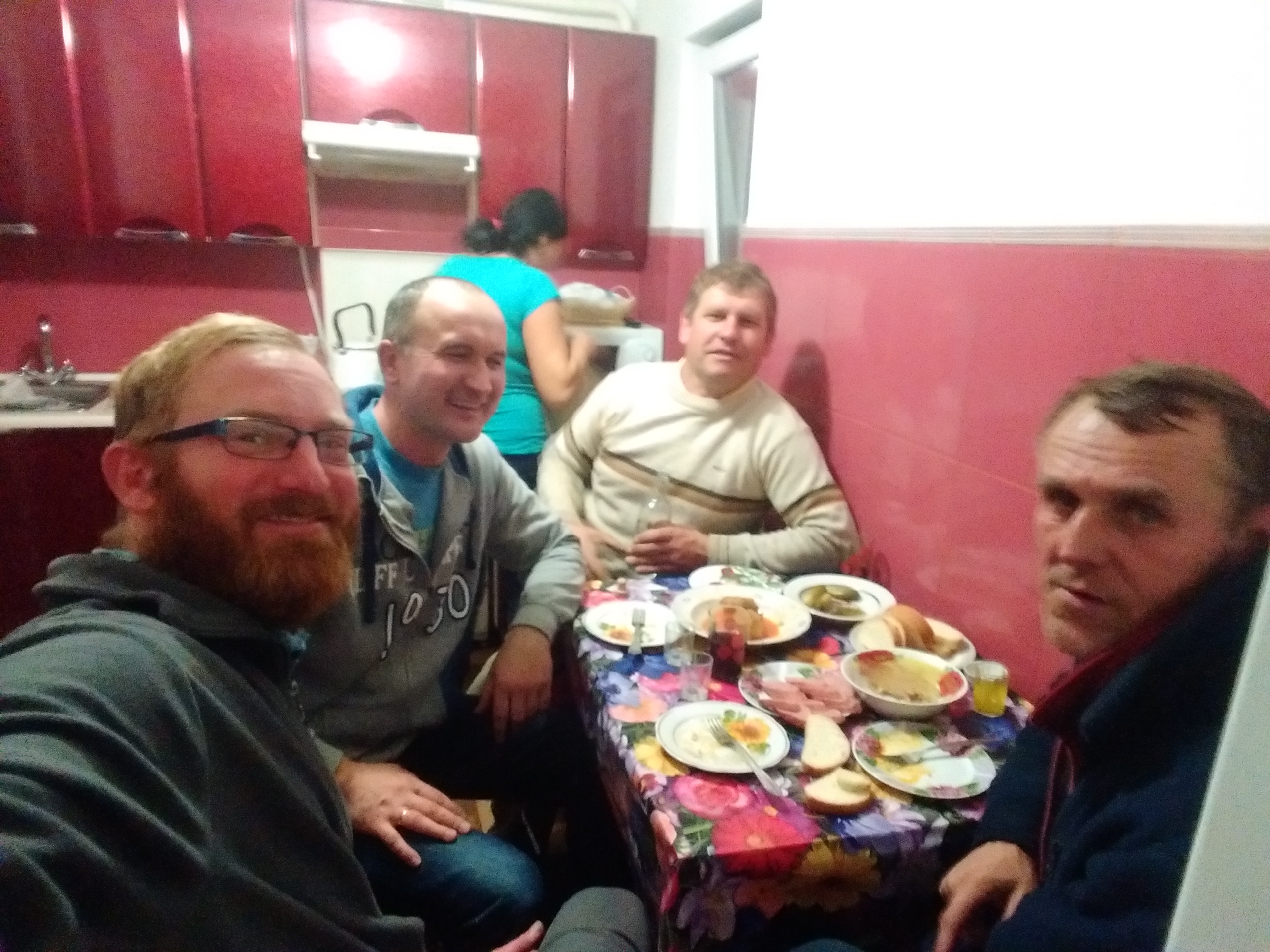
The next day they help me repair the bicycle. There is even a little shop that offers spokes. Not exactly the length I need, but it works. I get rid of the wobbling and also find the cause for my exploding tires: A small metal piece of the brake was scratching along the tire all the time and got sharp like a razor blade. That caused the exploding tire in Mongolia and Russia already.
The bicycle is all good again, but the storm is not yet gone. Some trees have fallen on the streets and branches are flying around. Unfortunately I cycle through a lot of farm land, so there is no forest to protect me from the wind.
Anyway I make it to Kremenets and the next day continue to Pochaiv. The storm is gone finally. But a few kilometers to Pochaiv the bicycle starts to wobble again. Like in Seoul, all spokes are loose.
Someone asked what I was missing after a year on the road. I want to add something now: German quality.
It’s just embarrassing, that the Korean cycling shop was not able to tighten the spokes properly. I mean even an Indian 50 Euro bicycle won’t have loose spokes after 6000 km on mostly paved roads. The whole wheel is just not well assembled. I take a break in Pochaiv, which by the way has a massive monastery.
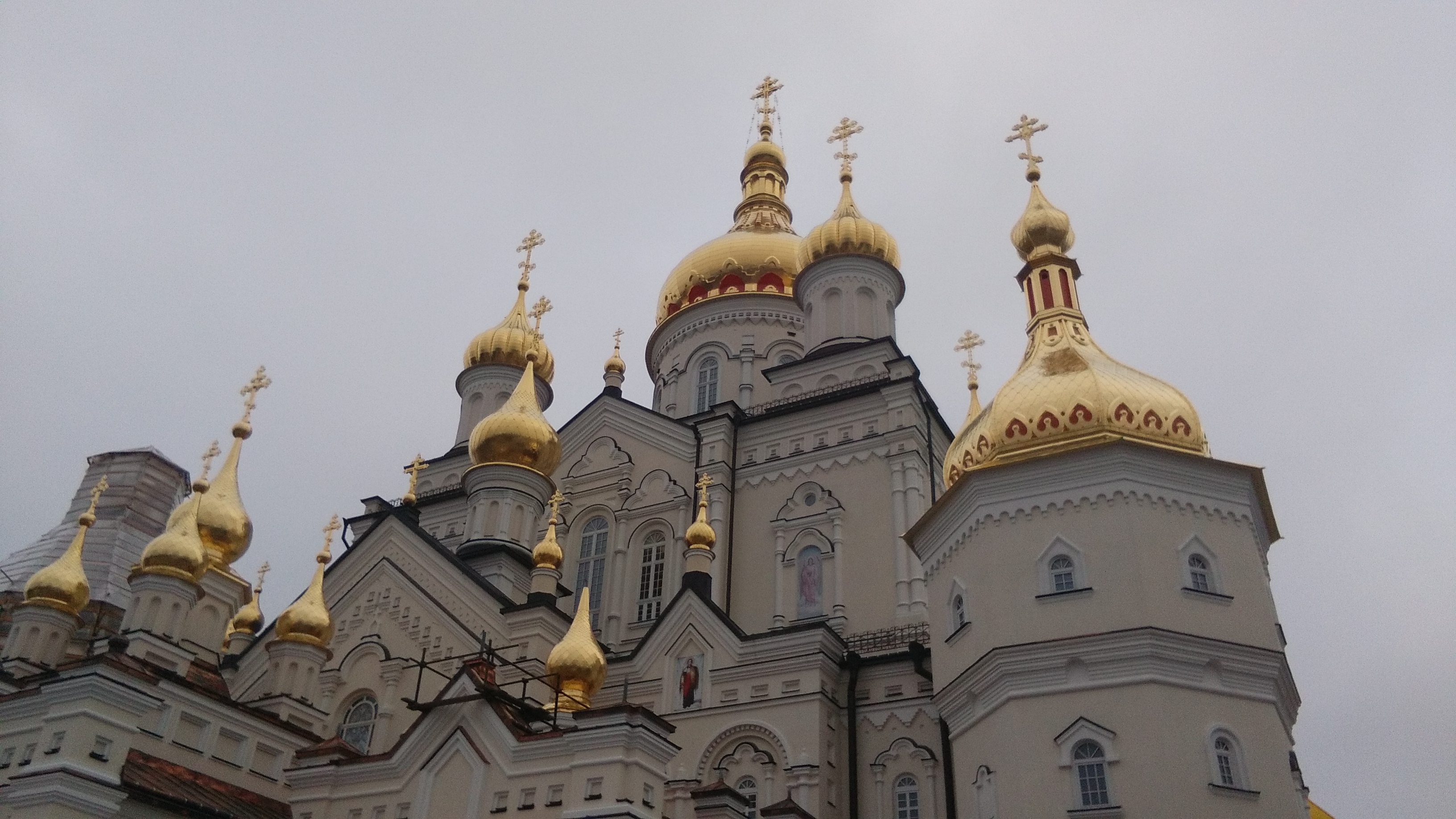
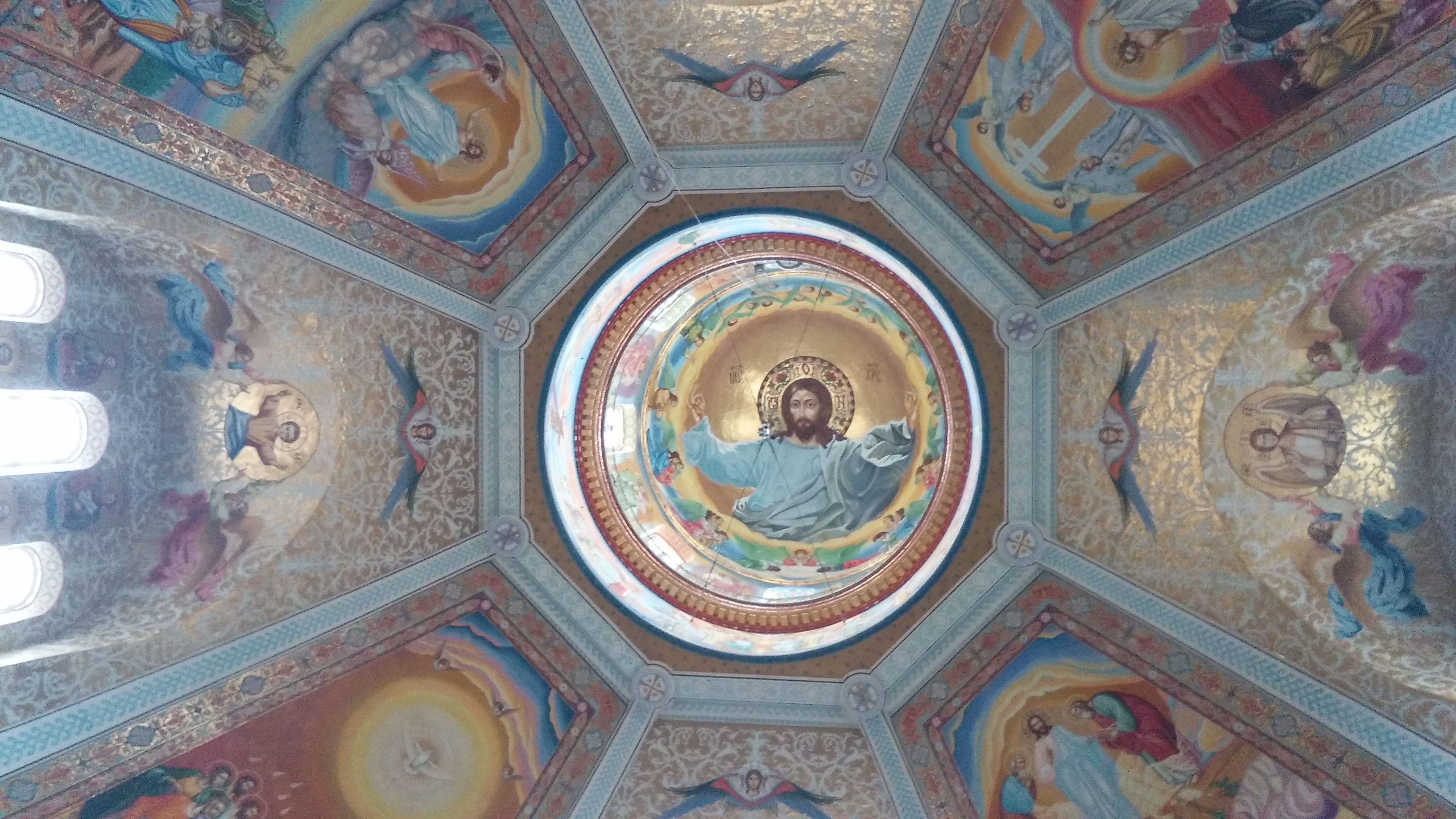
Now what? There are some Marshrutkas running, but they can’t take bicycles. The next train station is in Radyvyliv, roughly 25 km away. I decide to cycle there, even if that means, that I can throw away the whole wheel afterwards. I can take the train to Lviv then and get a new one there.
After a few kilometers I slowly overtake an older guy on a bicycle. He has a contagious smile and somehow looks like he loves cycling. Indeed. We talk a bit and I tell him about my rear wheel falling apart. He says, that’s no problem, he can fix it. I’m not really sure, if he knows what he is talking about, but it turns out he is a retired bicycle mechanic. What a coincidence!
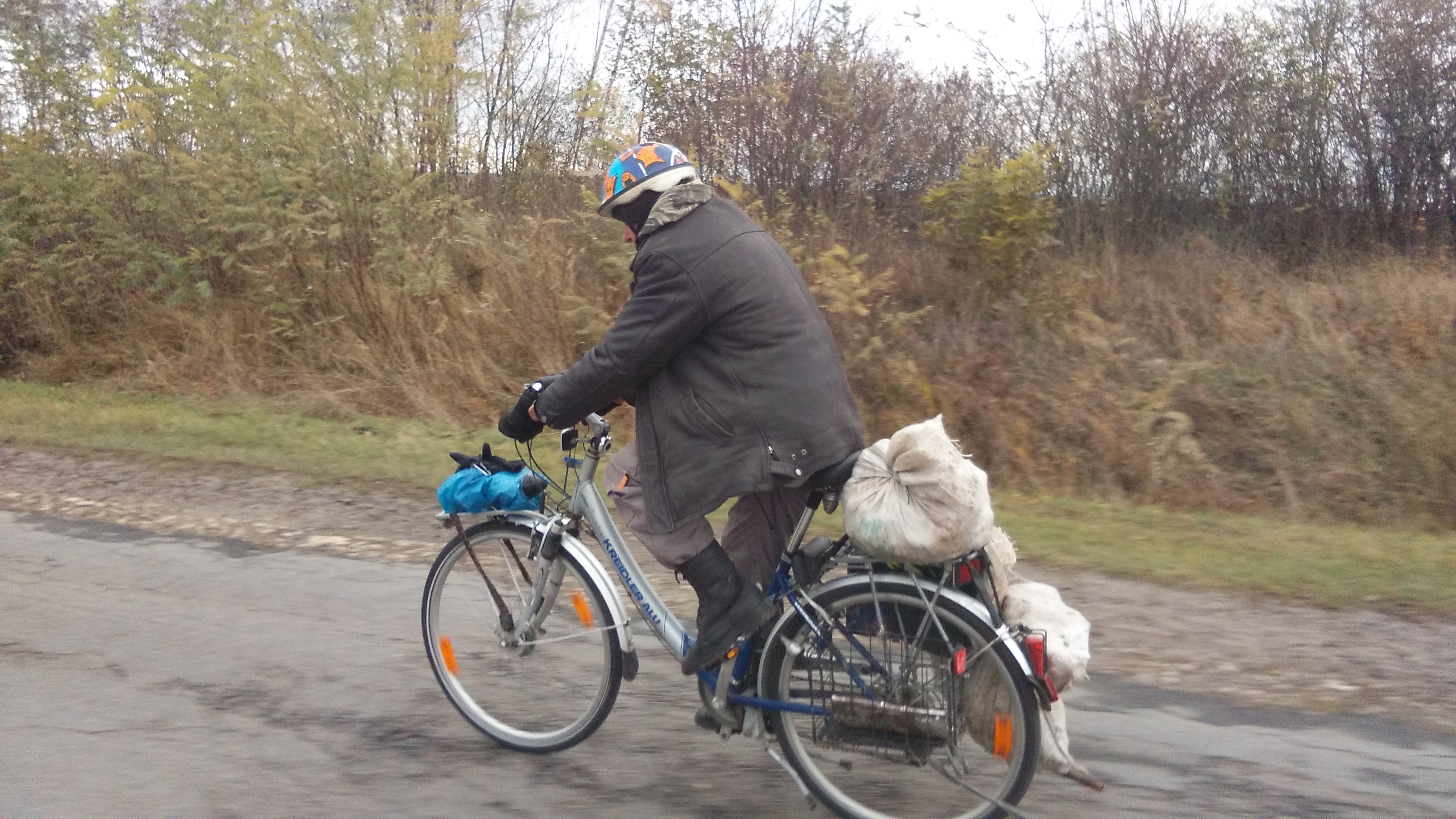
His wife has already prepared dinner, when we arrive. Then he takes me to his workshop and within 2 hours he replaces 5 or 6 spokes and tightens all others. He didn’t have new spokes, but took some from another wheel, that was laying around. He says: „They are German, they don’t break“. True. True.
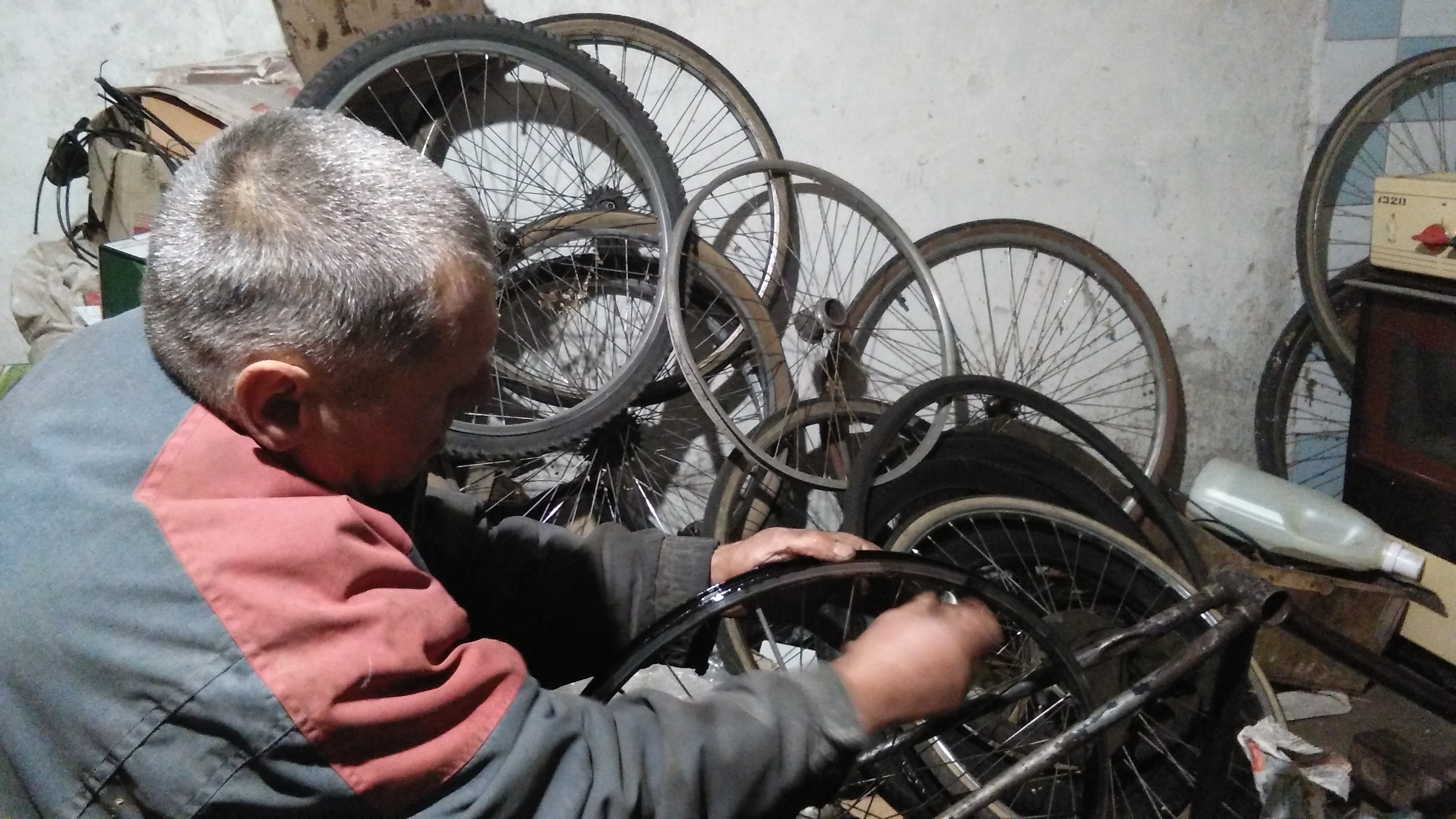
Then finally my last 120 km to Lviv. I have heard so much about this city already since I entered Russia in Siberia. It’s truly beautiful. One evening I have dinner in an Uzbek restaurant with pictures of Buchara and Samarkand on the walls. Good memories. I like how Ukraine not only has a connection to these ex-soviet countries, but also to Central and Western Europe.
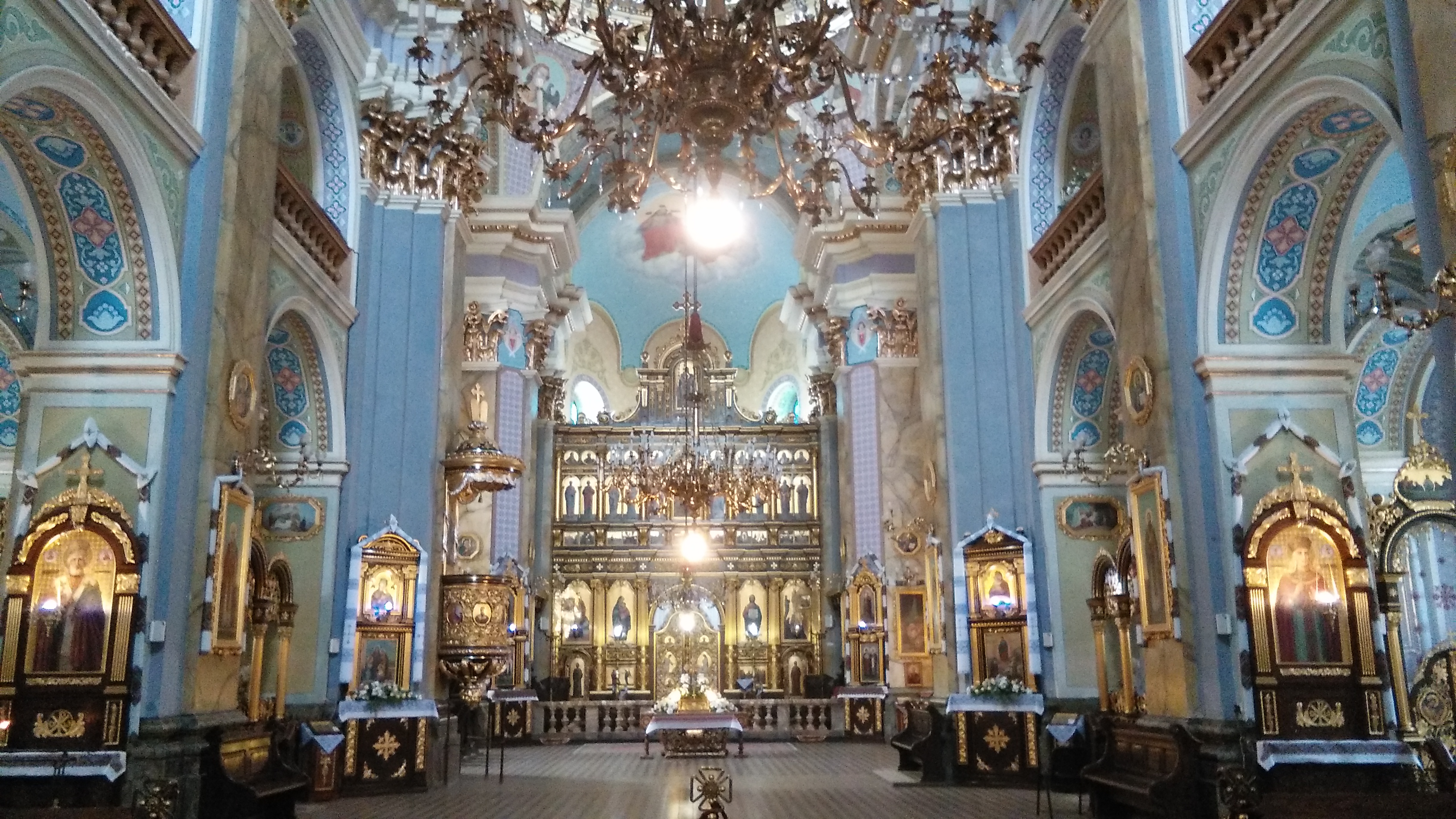
I stay three nights, before I continue towards Poland.
Rebirthing
You know these seminars? I think it’s a US invention. You go there and then they simulate the process of birth so you can go through it again and that’s supposed to change your life for a better.
I think that’s what describes the last 80 km to the EU border pretty well. Again an autumn storm. Then hail, rain and I think it’s around 0°C. Like I have to go through the process of becoming a EU citizen a second time. When I finally arrive at the border after sunset I am exhausted like I have only been a few times on this journey.
Apart from the fact, that the border crossing is very professional and the EU seems like a fortress from the outside, it’s rather normal. They look in some of my bags. And then I enter the EU.
Europe/European Union/Schengen/Euro-zone
This info box is completely informative. I write it down because I have been asked this a lot of times and I think even European citizens don’t always know how things actually are:
I entered Europe already a month ago east of the Ural. The edge of the European continent goes through Yekaterinburg. The Ural itself is part of Europe.
By entering Poland I entered two more „levels“ of Europe. First, I entered the European Union. And second, I also entered the Schengen area. From now on I don’t need a passport any more, because within the Schengen area there are no borders and no border controls. For nobody. However, not every EU country has signed the Schengen agreement and not all countries, that have signed the Schengen agreement are part of the EU. Let me explain:
Right now, UK is still part of the EU, but it has never signed the Schengen agreement. That means, if I travel to the UK, I have to go through passport control, because UK has not signed the Schengen agreement. But I don’t have to go through customs, because UK is part of the EU, which is a trade union.
On the other hand, Switzerland (like Norway and Iceland) has signed the Schengen agreement, but is not part of the EU. That means, if I travel to Switzerland, I don’t have to go through passport control, but I have to go through customs, because I leave the EU.
The same is valid for all non-European citizens holding a so-called Schengen visa. They can move around in the Schengen area with that visa, even if they leave the EU. But they need a separate visa for the UK, even though they stay inside the EU.
But that’s not all. I’m now in the EU and also in the Schengen area. However, Poland is not part of the Euro zone. That means, it has its own currency: Zloty. Even when I enter Czech Republic I won’t be inside the Euro zone. Czech Republic also has its own currency: Koruna. Only when I enter Germany I will finally be in Europe, in the EU, inside the Schengen area and able to pay with Euro.
Welcome to the European Confusion.
I liked Ukraine a lot. Maybe not needing a visa was one reason. I finally felt like I can relax. I didn’t even realize that during our trip. But now I realize how much pressure it sometimes puts on you. Always checking, if you can make it out in time. Always hoping that there is no problem with the bicycle on the last few kilometers to the border.
But Ukraine of course was not only about that. I liked the people a lot. Maybe because once again they helped me so much when I was in need. From the first day on I noticed that they are very welcoming and not reserved at all. Also they smile much more. Another thing I want to point out are the strong communities in towns and villages. In general, I think we should take a look at these countries to understand the German history. The West-Germans just assumed they know how things are done and the East-Germans needed to catch up. That’s not exactly right. Demonizing Russia and belittling Eastern European countries might work on a political level. But there is much more about communism than what politics can tell.
In my opinion it is important to understand these countries in order to understand recent movements in Europe. But well, I’m not writing about politics.
I liked the Ukrainian dishes a lot: Most famous are probably Borsh and Pelmeni, but I also enjoyed the Central and Southern European influence and the absolutely high standards. Many bakeries have delicious cakes and pastry and almost every shop offers countless boxes of cookies and candy. Things you have never eaten before.
Ukraine prepared me to enter the EU. One day, I’m sure, it will be part of this Union.
Good-Bye Ukraine. Thanks for the surprise.
Hi Wolfgang,
great to see you are back, I have been back to Shanghai since mid of Sept. It seems that you will be in the office again after Christmas!
Best regards,
Jibin